The unquiet dead
“Now I’m going to die in a dungeon. In Cardiff.”
I have to admit I have slightly mixed feelings about this episode. It being an episode of Doctor Who, the ghosts oviously turn out to be aliens, but the séance scene is reminiscent of real world spiritualist practices, which are very frown upon by the Church (and for a good reason, irrespective of whether one thinks they are fraud or not – but that’s another topic). That’s why that scene makes me cringe a bit. But all in all, it’s one of my only two gripes about this episode, and I still like it. (Well, after some time I found a third problem with it – when Rose says “You can go back and see days that are dead and gone, a hundred thousand sunsets ago”, she apparently got her math wrong – there were only 52731 days between Christmas 1860 and April 9, 2005, when this episode aired! But that is nitpicking, of course.)
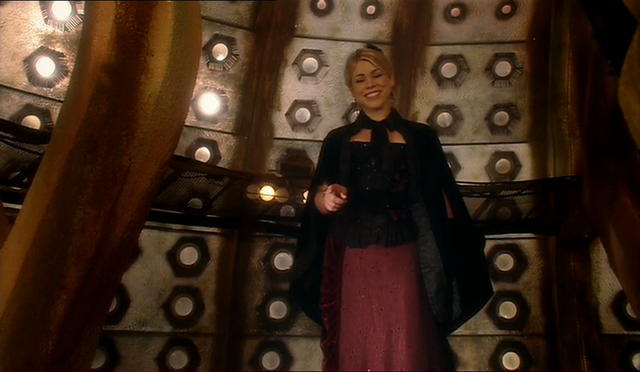
I think there was at least one story for every (female) companion and in every series where she had some gorgeous outfit suitable for the period or place she was in. Or supposed to be in.
On the other hand, there are a lot of things to like in this episode. Let’s start with the obvious. The scene where Rose changed and the Doctor reacted to her in his very Doctorish way was fantastic. Indeed, I think this was one of the two episodes where Rose looked the best. But that’s not everything great about this episode – far from it!
Subtle touches
First of all, I think the quiet scene where Rose and Gwyneth talk to each other, has a cute bit of foreshadowing. And I’m not talking about the “Bad Wolf” stuff, which is evident (and frankly, a bit heavy-handed here). When Gwyneth says “Maybe your dad’s up there waiting for you too, miss”, and then “you’ve been thinking about him lately more than ever”, the events of spoiler for series 1Father’s day and later spoiler for series 2Rise of the Cybermen and spoiler for series 2The age of steel immediately come to mind. I am fairly sure that sentence is there on purpose!
Then, the Doctor again revels in a terrible pun (“I love a happy medium”), with Rose reacting appropriately. I have to admit that I adore terrible puns, and this one made me chuckle.
Also, it is difficult not to love every single interaction between the Doctor and Charles Dickens, from the hilarious “number one fan” admission from the former to the “my books… do they last?” heartbreaking question from the latter. And let’s not forget that the Doctor has so much respect for Dickens that he actually apologizes to him after being rude – it’s not something he does frequently!
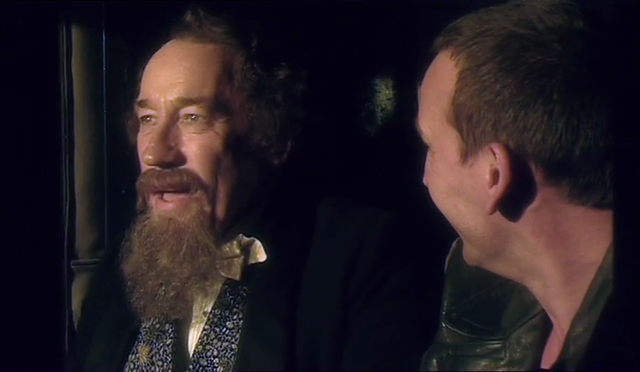
Charles Dickens might be the only person in existence to make the Doctor forget about Rose (even if only for a moment).
I was also quite moved by this particular piece of dialog:
– Can it be that I have the world entirely wrong?
– Not wrong. There’s just more to learn.
It is actually a pretty good metaphor of how science works – while more and more accurate theories are developed, the old ones are often still useful approximations.
It’s like recycling
Then, the episode poses serious questions, and I love when Doctor Who does that. Is it right to “use” bodies of dead people instead of burying them? Why do we even bury corpses? Is organ transplantation morally good? If so, why are so many people abhorred by other atypical practices regarding dead bodies? What “uses” of human corpses are fine and what are not? I do not intend to untangle all of this – I don’t even think I’m competent enough – but here are some of my thoughts. For starters, I agree that being an organ donor is a honorable thing to do. While dead bodies of loved ones (and in fact all people – well, everyone is loved, so that should go without saying) do deserve respect, here we have people deciding to give part of themselves to save other people lives. That’s really awesome! I also don’t have a problem with prospective doctors training in the dissecting room – that seems necessary to teach them to save people.
And then there are shady practices, like organ trade, which is almost universally forbidden, but still happening at least in some places. (Though interestingly, in my country, when you donate blood for transfusion, you can deduce some arbitrary equivalent when doing taxes, since this is considered similar to a gift to a suitably registered charity. Not organ trade, of course, but somewhat close…) On the other side we have infamous situations where people were literally killed for organs by ambulance crews. Somewhere in between there is a line dividing good and evil, and I honestly have no idea where it is exactly. But I like the fact that The unquiet dead poses the question.
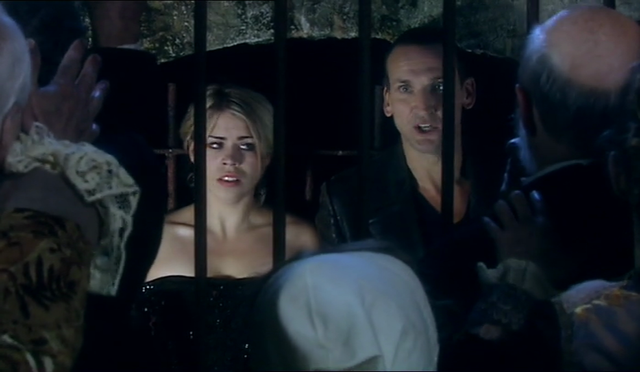
It's just like being an organ donor, except you're alive and sort of… screaming. – spoiler for series 5the Eleventh Doctor, in a similar situation
With all that said, we have this brilliant line from the Doctor: “I’ll take you somewhere […] you can build proper bodies. This isn’t a permanent solution, all right?” This is actually a spot-on description of the current state of affairs. I would expect the whole field of transplantology to vanish once we learn to create better prosthetic organs and possibly grow organs from other cells. (Of course, both ideas give rise to interesting moral questions of their own, but that’s another story.)
Even putting the organ transplantation issues aside, the question about what is acceptable and what is not regarding corpses is a good one. This exchange sums it up pretty well:
– Seriously though, you can’t.
– Seriously though, I can.
– But it’s just wrong. Those bodies were living people. We should respect them, even in death.
– Do you carry a donor card?
– It’s different, that’s…
– It is different, yeah. It’s a different morality. Get used to it. Or go home. I can’t worry about a few corpses when the last of the Gelth could be dying.
This is actually a great piece of dialog. First of all, it’s yet another time when the darker side of the Doctor shows. Doing whatever he wants even if the companion disagrees is very common for him, but “get used to it or go home” is pretty harsh on Rose. (Especially taking into consideration how emphatic she is – for yet another example, when the Doctor asks Dickens “Did you see where it came from?”, Rose notices Gabriel Sneed taking Mrs Redpath and calls him out on that. There's a lot of difference between satisfying one’s curiosity and noticing someone essentially stealing a corpse…) Although one has to admit that he at least partially changes his mind later and considers the dead-bodies-as-vehicles affair to be only temporary.
The more important thing, however, is that Rose does not offer any arguments for her judgment – just her intuition that it’s wrong – but still is on point. In fact, this is the other case of my mixed feelings about The unquiet dead. As someone who strives to view the life and the world in a rational way – the approach which is very strongly promoted in Catholicism – I tend not to trust intuition too much. (Which is not to say that I disregard it altogether – it’s rather a “I need it confirmed by the reason” attitude.) Here I have to admit that Rose got it right even without reasoning, seemingly based on emotions alone (and emotions are a notoriously bad advisor). We’ll get to this shortly.
And all this leads to the most fundamental question posed by this episode. How do we tell the good from the evil?
Discernment of spirits
There is a very old notion, present in the New Testament, that there is a need to discern between good and evil spirits and impulses. (And of course the fact that humans need to discern between good and evil in general is clear and has been so for thousands of years.) While this is fairly obvious, it is less obvious how to do it. Well, I don't feel like a theological authority, but it seems that either you have a special gift from God (see 1 Corinthians 12:10), or you use reason. Let me repeat, reason – definitely not emotions, like some people claim. If you feel something is good or evil, that’s probably not enough – you should know it. (Though to be fair, these feelings are also right a lot of time – but you should use your reason as the final authority, not the emotions.)
Interestingly, out of the three people who expressed their opinion on the issue of Gelth using the bodies of dead people, only Rose got it right, and the Doctor and Gwyneth got it wrong. It is quite obvious, even if surprising, why the Gelth were able to fool the Doctor – he was spoiler for series 1overriden by guilt after the Time War and after what he did in it. Let me note, though, that it is the same story again – the Doctor was fooled by his emotions. He clearly saw Mr Redpath’s body being quite hostile to Rose. If the Gelth just wanted to survive by inhabiting the corpses, they should have had no business with the living! If he had acted on reason, he could have put two and two together and conclude that the Gelth were lying. (Now that I think of it, I am wondering if the Gelth knew who they were speaking to. If so, they must have been aware of the immense risk. If fooling the Doctor went wrong, well, things would certainly go bad for them…)
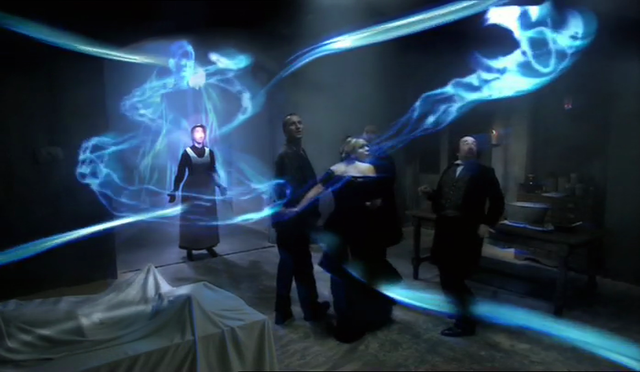
“She has given herself to the Gelth” – it might have been at this moment when Gwyneth died…
It is perhaps less unexpected that Gwyneth was mistaken, too. While Rose considered her stupid (or so she claimed, and being a psychic lends some credibility to what she said), she was definitely pretty smart – but rather naïve. She knew full well that her “angels” killed Mr Redpath, for instance, but fell for their trap anyway. I have to admit, though, that once she learned of her mistake, she didn’t hesitate much to give her life to save the others (much like Jabe previously). Well, actually it is not obvious that she did… The Doctor claimed that she was already dead by then, but somehow still able to speak and act, and in fact his behavior after he seemed to check her pulse while talking to her would confirm that. Here is my little personal theory. We know from the previous events that people “possessed” by the Gelth seem to retain some part of their mind – for example, Mrs Peace’s corpse still went to Dicken’s show. So, it might be the case that the Gelth already killed Gwyneth, but she still retained her caring attitude and tried to save people – only now she saved the Doctor and company, not the Gelth (who turned out not to need saving at all).
Now, why did Rose get it right? I don’t think she had some logical reasoning behind her intuition, so it seems that what happened contradicts what I said about using emotions as a moral guide. In fact, the situation is a bit more complicated. It’s true that she could not give any rational argument for her stance that using bodies of dead people is wrong, but once that she had that established, what followed was perfectly rational. Since she decided that, the only logical conclusion was that no good ends justify wrong means. (Of course, we know that allowing the Gelth through to our world was no good end, but that was not obvious to her – even if possible to deduce – at the time.) In fact, that alone might be the most important lesson from this episode!
Last but not least
One last thing I’d really like to mention is the comment Rose made about Gwyneth’s sacrifice:
She saved the world. A servant girl. No one will ever know.
I love this quote. It is a great reminder that in order to achieve greatness, you need to be humble first. This seems a pretty universal truth. There are lots of examples in literature (it’s hard not to think of Samwise Gamgee, but he’s hardly the only one), but it’s wider than that. In fact, this is one of the important tenets of Christianity, probably most famously exemplified by Mary, Mother of Jesus. Also, Gwyneth being a servant can be also significant – serving is the ultimate way of achieving greatness. While not necessarily a popular idea nowadays, there are traces of it even in our language – the word “minister”, for example, means “one who serves”. It is also one of the ingredients of true love – serving your loved ones is something you must do in order to be able to seriously claim that you actually do love them. As an aside, it is not true that “no-one will ever know” – Rose knew, the Doctor knew, and later they told at least two other people (spoiler for series 1 Mickey and Captain Jack). And even if not for that, no good deed is truly forgotten (of course).
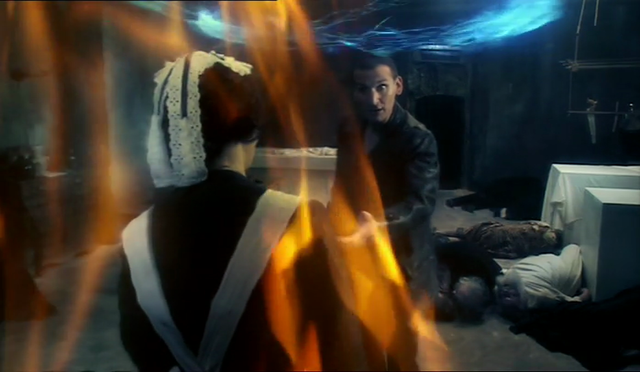
Ready to sacrifice himself anytime. Even for a XIX century servant girl no-one but God and just three people will ever know about.